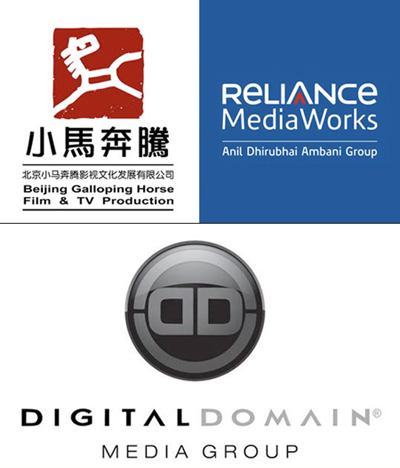Digital Domain sold to Chinese film venture
- By Zhang Rui
 0 Comment(s)
0 Comment(s) Print
Print E-mail China.org.cn, September 26, 2012
E-mail China.org.cn, September 26, 2012

Bankrupt Digital Domain Media Group, the Academy Award-winning company behind the visual effects for the likes of "Titanic," has been sold to China's Galloping Horse Film Co. and an Indian company.
Digital Domain sought Chapter 11 bankruptcy protection on Sept. 11, 2012, after defaulting on a US$35 million dollar loan. The company had been suffering due to furious competition in the increasingly global special effects business, fewer film projects and rising expenditures from new efforts. According to Bloomberg, Digital Domain's US$30.2 million sale of its production studios won bankruptcy court approval last Monday.
Galloping Horse America, a division of Beijing-based Beijing Galloping Horse Film Co., and Mumbai-based Reliance MediaWorks Limited acquired Digital Domain's visual effects unit, Mothership Media, as well as several of its other businesses and assets. The companies agreed to pay the sum of US$30.2 million, take on contracts worth US$3.6 million and in addition pay another US$2.9 million in employee wages, according to court records.
"This is a great day for Digital Domain," said Digital Domain Chief Executive Ed Ulbrich, "Our new partners have incredible strength and reach within the global entertainment marketplace. They are powerful strategic partners that understand our business and our clients' business. Their support enables us to continue creating the highest quality entertainment and advertising, and puts us in the strongest financial position that Digital Domain has ever been in."
Galloping Horse, which will reportedly hold a 70 percent stake in the joint venture, will pay US$20 million of the purchase by taking out an interest-free loan from the Beijing Municipal Bureau of Radio, Film and Television, Bloomberg reported.
Digital Domain partnered up with Reliance last July to collaborate on a patented 3D conversion process. Reliance was owed US$4.6 million as an unsecured creditor, as shown by the bankruptcy files.
Last Saturday, former Digital Domain Chief Executive Officer Scott Ross initially tweeted that Beijing-based Galloping Horse had acquired 75 percent of the company and Reliance would take over the other 25 percent.
"Digital Domain is a legend in the industry, known for its world-class quality of work and creative talent," said Ivy Zhong, vice chairman and managing director of Galloping Horse said in a statement. "We are thrilled to have found a partner in Reliance MediaWorks that is as committed as we are to ensuring Digital Domain's continued excellence and success."
Galloping Horse signed on as co-producer and distributor of the animated feature, "The Legend of Tembo," with Digital Domain in April this year during the Beijing International Film Festival. John Textor, the then boss of Digital Domain who resigned in early September, at that time stated that his company would help Chinese filmmakers realize their dreams on the big screen and explore many more Chinese stories to tell the world. "It's a partnership to build a state of art, a world-class standard digital production studio," he said.
|
|
|
John Textor (L), the then CEO of Digital Domain, meets Ivy Zhong, vice chairman and managing director of Galloping Horse at the second Beijing International Film Festival in April to discuss the collaborations on a film production base in China and animation "The Legend of Tembo." [File photo] |
"At that time, there was a form of partnership," Ivy Zhong told iFeng.com yesterday, "Now we are leaders. This changing role will bring along more changes, especially for China's film production development."
"Currently many Chinese film companies still have to go abroad for post-production. The cost is extremely high, but that is because the visual effects industry in China is so weak. Although we do have some advanced equipment here in China, the talent and innovation lag far behind that of Hollywood," Zhong added, "As the second largest film market in the world now, China's film industry still has a number of weak points. Being part of this industry, we feel that we have the responsibility and obligation to perfect it and push it forward."
Wang Ran, CEO and co-founder of China eCapital Corporation, was the one who helped broker the deal. He wrote on his microblog that the marathon negotiations lasted for 13 hours and they went through more than 10 bidding rounds .
"Hollywood is still feeling the heat from the economic crisis," Wang told Chinese news portal iFeng.com, "They need some financial help from outside. At the same time, China's domestic film industry is growing quickly, but its market is still relatively small, so they also need to expand onto the international market by using Hollywood's power and influence. Given the circumstances, China and US companies can really achieve something together here."
Founded in 1993 by "Titanic" director James Cameron, Stan Winston and Scott Ross, Digital Domain has created state-of-the-art effects for over 90 films, including "Titanic," "I, Robot," "Tron: Legacy," "Pirates of the Caribbean: At World's End," and the "Transformers" franchise. Cameron currently no longer holds any stakes in the company. In May of 2006, Digital Domain was purchased by an affiliate of Wyndcrest Holdings, LLC, a private holding company whose principals then included Wyndcrest founder John Textor and director Michael Bay. Bay sold off his company shares around March 2010.
As Chinese film industry is growing at a remarkable pace, the purchase just marks the latest acquisition of a U.S. media company by a Chinese firm and is reminiscent of China's Dalian Wanda Group recent purchase of AMC Entertainment, the U.S.' second-largest theater chain.







Go to Forum >>0 Comment(s)